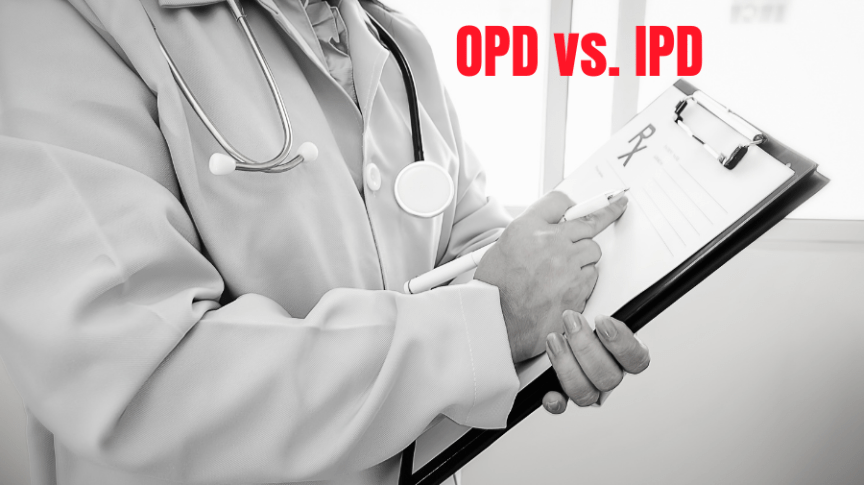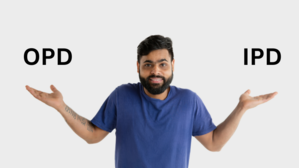Learn why leading HR professionals trust ekincare! Explore Now

In the intricate world of healthcare, numerous acronyms and abbreviations can often leave healthcare consumers perplexed. Among these, "OPD" and "IPD" are terms that are frequently heard but not always fully understood. In this blog, we will delve into the intricacies of OPD and IPD, decipher their full forms, explore their roles in healthcare, and address the common questions that arise when navigating the complex terrain of healthcare.
OPD Full Form: Outpatient Department
IPD Full Form: Inpatient Department
In a healthcare facility, the Outpatient Department (OPD) and Inpatient Department (IPD) are two essential components, each serving distinct purposes in healthcare delivery.
The Significance of Regular Health Check-ups
Preventive care is like a shield against future health challenges, allowing for early detection of underlying issues and the implementation of timely interventions. These check-ups provide an opportunity for healthcare providers to offer guidance on lifestyle choices, nutrition, and making informed decisions to mitigate risks and enhance their quality of life.
How OPD Plays a Major Role in Preventive Care
Routine health check-ups through the Outpatient Department (OPD) play a pivotal role in maintaining overall well-being. Preventive healthcare is a proactive approach that focuses on identifying potential health risks before they escalate into serious conditions. Regular OPD visits are instrumental in this regard, as they facilitate routine check-ups, screenings, and consultations for chronic conditions, that enable healthcare professionals to assess an individual's health comprehensively.
The Role of Technology in Scheduling and Managing Check-ups
In a world where the adage "prevention is better than cure" holds true, prioritising preventive healthcare through OPD visits becomes a cornerstone of a health-conscious lifestyle. As we navigate the complex landscape of healthcare, recognising the importance of preventive care becomes a fundamental step towards achieving comprehensive well-being.
Many individuals delay or avoid their health checkups, due to hassles in appointment booking via phone calls, uncertainty about wait times, and time off from work. Advancements in healthcare technology, as seen on platforms like ekincare, have streamlined the process of preventive healthcare. Digital tools enable individuals to schedule regular check-ups, receive timely reminders, and maintain digital health records. This integration of technology into healthcare not only enhances accessibility but also encourages a proactive and engaged approach to one's health.

IPD is reserved for patients who require hospitalisation, and the scope of care provided is extensive and multifaceted.
Complex medical interventions
IPD serves as a domain for treating severe and complex medical conditions that necessitate inpatient care. Patients grappling with critical illnesses, infectious diseases, and conditions that require continuous monitoring are admitted to IPD. They receive specialised care, including access to critical care units and advanced medical technologies.
Surgical Interventions
One of the critical aspects of IPD treatment is the ability to perform complex medical procedures and surgeries. IPD is equipped with the infrastructure and expertise necessary to conduct a wide range of surgical interventions, from minor surgeries to major procedures. Patients who require surgical treatments and organ transplants receive these services within the confines of the Inpatient Department.
Post-Operative Care and Recovery
In IPD, the care doesn't end with the surgical procedure itself. Post-operative care and recovery are integral components of IPD treatment. Patients receive continuous medical attention, including pain management, wound care, and rehabilitation. Healthcare professionals closely monitor patients' progress, ensuring they are on the path to a full and healthy recovery.

OPD visits and IPD admissions are not mutually exclusive, and a person might utilise both in his/her lifetime and in the treatment of a medical condition. OPD visits may lead to inpatient admissions and IPD admissions may be followed by OPD follow-ups.
Preventive health check-ups
Follow-ups for chronic medical conditions like Diabetes, Hypertension, PCOS, skin conditions, infections, etc.
Acute respiratory and gastrointestinal illnesses in both children and adults
Post-surgical follow-ups
Pregnancy check-ups and post-delivery follow-ups
Paediatric checkups for vaccinations and well-child visits
Minor injuries
Musculoskeletal problems
More serious situations often require inpatient care.
Need for constant medical supervision: IPD is required if the patient needs round-the-clock monitoring or frequent medical interventions, which is not possible with OPD.
Recovery time needed: IPD enables extended rest and recovery, whereas OPD allows patients to recover at home between visits.
Availability of home care and support: IPD may be preferred if the patient lives alone or lacks caregiver support at home. With help at home, OPD can work well.
Overall, the right choice depends on the patient's medical condition and the doctor's medical judgement. Both OPD and IPD play an indispensable role in the healthcare system.
The Role of ekincare in the OPD Scenario
ekincare is designed to offer comprehensive healthcare solutions, bridging the gap between patients and healthcare providers, enabling access to timely healthcare, and streamlining the appointment process.
Scheduling Appointments with Healthcare Professionals

Patients can easily book appointments for consultations, follow-up visits, and master health checkups; healthcare providers can efficiently manage their appointments.
Tracking Medical History and Digital Health Records
ekincare's digital health record system securely stores all the patient's medical information, making it readily available when needed. Patients can track their medical history, test results, and treatment plans.
In an ever-changing complex healthcare ecosystem, knowledge, access, and support are your greatest allies. Understanding OPD and IPD, the services they offer, and the distinctions between them is the first step. Making informed decisions about your healthcare needs, whether it's choosing OPD for preventive care or IPD for complex treatments, is the next step.
Regular check-ups through OPD visits can help prevent serious health issues that may necessitate IPD treatment. It's a proactive approach to maintaining your health, catching health issues early, and ensuring you receive the care you need.
With the knowledge and the right tools at your disposal, you're better equipped to prioritise your health and well-being.
Learn how your organisation can get the best employee health and well-being experience with ekincare`s commitment to quality.